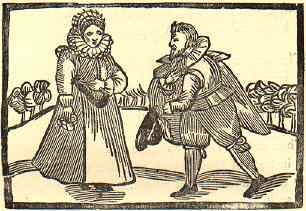Comedy and romance
Abrupt and irrational betrayal, a maid disguised as a youth*, romantic love at first sight, a threatening wild beast, a hermit, and the green forest of Arden: all fit neatly into the tradition so beloved of Elizabethans (and others since), the comedy of romance.
Yet in this romantic tale, there is at least one discordant note, Jacques, who sees the whole pageant of human life as one depressing role after another. His is the voice of the satirist* who wishes to "Cleanse the foul body of th'infected world" (2.7.60). On each of the pages that follows there is some hint of the romantic tradition being treated ironically.
Footnotes
-
Gender layers
The actor was of course a boy, so there was an extra level of irony in these plays of disguise: a boy actor playing a woman disguised as a young man.
-
Jaques, the voice of satire
Or the officially tolerated court jester or fool, who could, like Lear's Fool, get away with saying things that would in others be seen as treason. Click for more on the Court Fool.
-
Shakespeare and comedy
Shakespeare had widely differing models for his comedies:
- though he may have known little about Greek comedy;
- he would certainly have read Roman comedy;
- he would have seen some morality plays with the prominent comic figure of the Vice;
- he had read the prose romances of Sidney, Lyly, and Greene and may have seen some of Lyly's plays performed;
- and he would have seen--perhaps acted in--a number of earlier romantic comedies.
